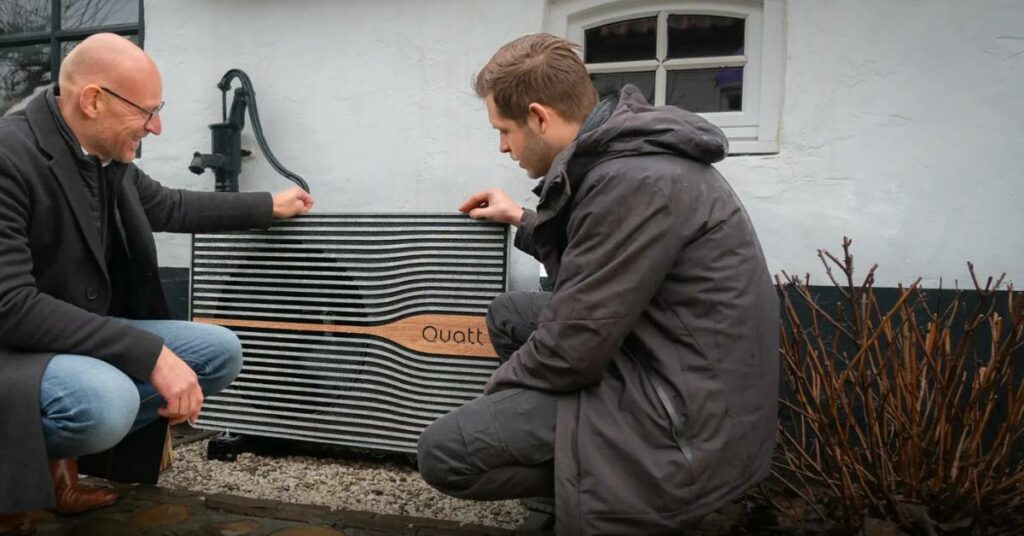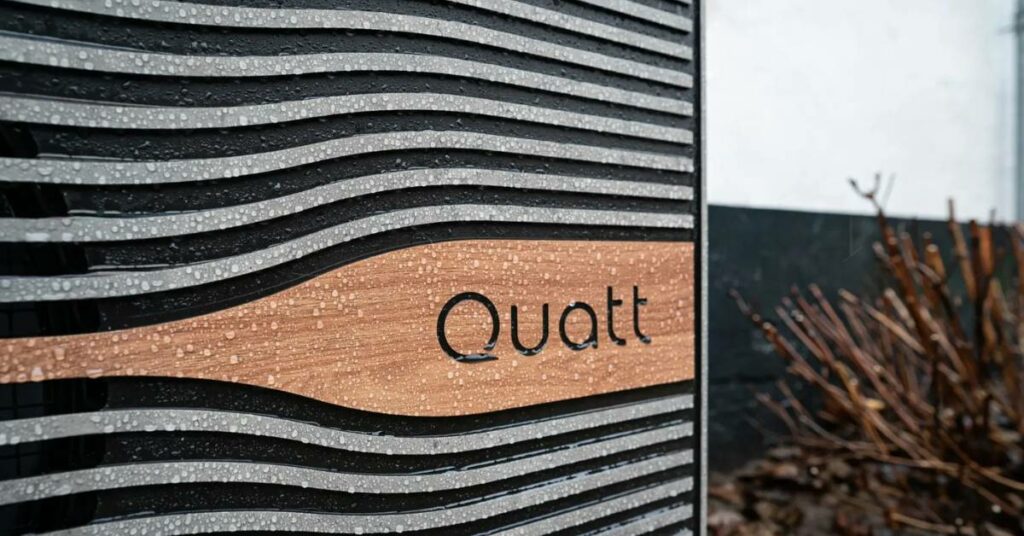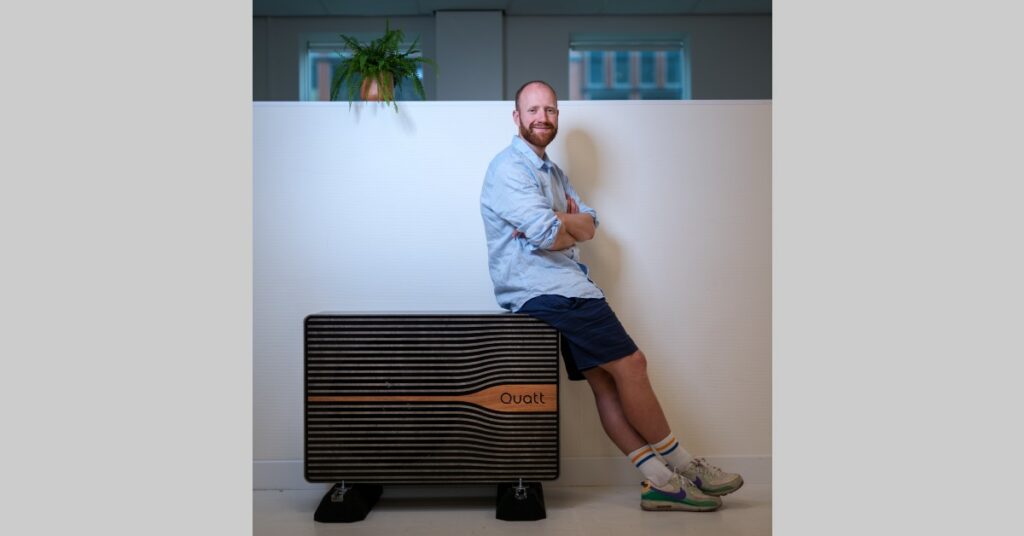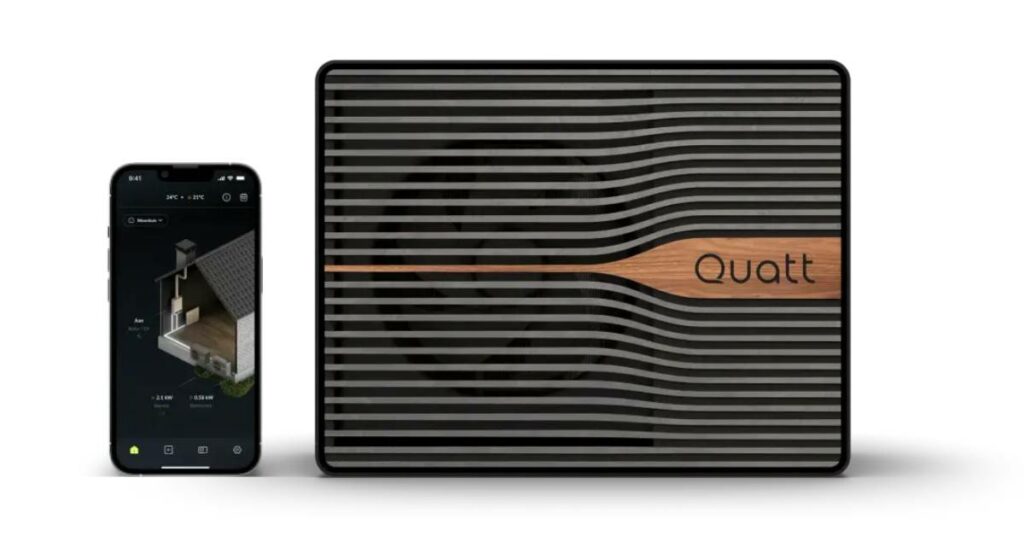On May 16, Dutch startup Quatt announced its €1.5M debt financing through Duurzaam Investeren, an online investment platform designed for sustainable energy projects in the Netherlands.
This funding came eight months after the startup had raised €2M in seed funding from Impact Equity Fund and Siep van der Valk.
Marijn Flipse, who co-founded Quatt with Bas Flipse in 2021, calls it a “relatively small debt round” to accelerate roll out of Quatt Hybrid installations.
Amsterdam-based Quatt is on a mission to “enable and accelerate the transition to sustainable home energy” for all through its AI-powered smart hybrid heat pumps.
As a company bringing hardware to the market, Quatt is in cash intensive business and its €4.8M in funding raised so far shows how the company is trying to maximise results.
Supporting energy transition

Flipse sees his decision to start Quatt as a “matter of doing morally good” and believes that solving climate change can help a lot of people live a better life, now and in the future.
With a warming planet, the energy transition challenge has become even more intense and a 1.5-degree celsius increase in temperature can result in severe heat waves, rising sea levels, biodiversity loss, and extreme weather.
The difficulty is that even scientists are less certain about the exact risks and consequences associated with a world crossing the 1.5°C greenhouse emissions limit.
“The higher above 1.5 degrees, the higher the chance that the city of Amsterdam will be underwater, or the higher the cost to ensure that doesn’t happen,” says Flipse, adding that we shouldn’t bet on the possible outcome.
He thus sees it crucial for the world to transition to a sustainable energy economy and one of the ways that Quatt is supporting this energy transition is through its AI-powered smart heat pumps.
“We do this by developing, selling and installing sustainable home energy products that are easy to buy, use and have the best ROI on the market,” Flipse explains.
The first product from the company is a smart hybrid pump called Quatt Hybrid, which Flipse says can save 80 per cent of household gas consumption for an investment of €2,799, including installation & subsidies.
Decreasing gas consumption

While reducing gas consumption was necessary for Europe to meet its zero emission goals, the need became necessary after Russia attacked Ukraine last year and cut off its gas supplies to European countries.
There is now an increased need to take homes off gas and the Netherlands has set a goal of installing 1.3 million heat pumps as part of its Climate Agreement by 2030.
While the country is expected to fall short of that goal by no less than 4,00,000, startups like Quatt could make a big difference.
Flipse reveals that they started commercial installations of heat pumps at the beginning of this year and had only a small installed base running during the winter.
However, that small base was enough to prove the tremendous amounts of gas saved with a smart heat pump and in the current weather, he sees Quatt Hybrid saving between 15 and 20 tons of CO2 emissions per day.
While that makes for a big difference in daily emissions, Flipse is also aware that this won’t be enough.
He says to truly accelerate adoption of these heat pumps and further reduce CO2 emissions in the Netherlands, they need to make the installation time of a heat pump much faster.
“The installation of a conventional heat pump takes around 1-2 days with 2 people. That’s just too long if you consider that the EU wants to install 30 million heat pumps before the end of 2030,” he says.
Quatt takes just over half a day to install its smart hybrid heat pumps and the startup is working to bring it down to less than half a day so they can install multiple heat pumps per day or team on a consistent basis.
In addition to innovation, he also sees a need for major policy changes to boost adoption of heat pumps starting with relooking at the noise regulation of heat pumps.
In its current state, the Netherlands has a binary regulation with one level of noise for night time and one level for day time.
Flipse says Quatt’s heat pumps are extremely silent and currently operate between the limits set by the government, but argues that they can allow a “little bit more sound for short amounts of time.”
He adds, “More power is only needed when it’s very cold outside, and thus when no one is outside to hear this sound.”
While he sees the current subsidies for heat pumps to be generous, he also taxing CO2 and having a clear vision and sticking to it will go a long way in decreasing gas consumption.
AI-powered smart heat pump

Heat pumps have been around for many years and Flipse agrees that the hardware is already good but has found a way to make them more efficient with the Quatt Hybrid.
Like other heat pumps, Quatt Hybrid also works by pumping heat from a low temperature (outside air) to a high temperature (water in your radiators).
Heat pumps need electricity to perform this action with more than 80 per cent of energy coming from the outside air and Flipse explains that Quatt Hybrid is more efficient since they have optimised the hardware for this purpose.
However, the area where Quatt’s hybrid heat pumps stand out is with the way their software controls these heat pumps.
Quatt’s CiC (commander in chief) learns the dynamics of a user’s home, when it needs heat, how much heat it loses, et cetera.
It combines these data with weather forecasting and other data to ensure that Quatt Hybrid makes less use of the existing gas boiler and maximises its use.
“This ensures we save more gas than others,” says Flipse, adding that they combine the best savings with price to offer the best return on investment.
Designing this smart hybrid heat pump hasn’t been easy and Flipse acknowledges that they had to do everything under extreme time pressure.
He says the challenge has been to build a talented team, ensure quality standards while not losing focus on its mission.
What helped? Flipse says being in Amsterdam helped since the city is relatively easy to attract foreign talent. “People across the world like to live in Amsterdam. This is also the reason why we have 24 nationalities working at Quatt,” he says.
He does say that Amsterdam doesn’t really have a lot of sustainable spaces to build hardware prototypes but Quatt has managed to find a workaround by renting a basement in their TNW office.
10,000 heat pumps

At the time of its €1.5M debt funding, Quatt had set itself an audacious goal of installing 10,000 hybrid heat pumps by the end of 2023.
Flipse says they started the year with an installed base of around 150 pilot units and began commercial installations only this year.
He says they now have an installed base of around 4,000 hybrid heat pumps but doesn’t see the startup meeting its own goal of 10,000 hybrid heat pumps installed.
This is partially because of the time it takes to install a heat pump and Flipse is keen to reduce that installation time further and increase its already high pace of installation.
“It would have been feasible if all went smoothly, but as everyone that worked in a startup knows, it never really works out exactly as you planned,” he says.
For Flipse and Quatt, the silver lining is the fact that the startup has efficiently used the funding and is able to grow around 20 to 30 per cent month-on-month.
Flipse says the company will go for a “significant follow up round” in the near future to support its growth.
“Our vision is that making the transition to sustainable home energy should save you money, make your life more comfortable, and your home more pretty,” he adds.
While it may not meet its goal of 10,000 heat pumps installed this year, the startup is definitely on track to meet its other goal of helping 3 million households transition to sustainable home energy.
It is building an upgrade module for Quatt Hybrid that will allow its customers to fully get rid of gas and adopt an all-electric energy system. Quatt is not just another startup but one whose success could help limit warming of our planet.
Read the orginal article: https://siliconcanals.com/news/startups/quatt-marijn-flipse-energy-transition-funding-interview/


